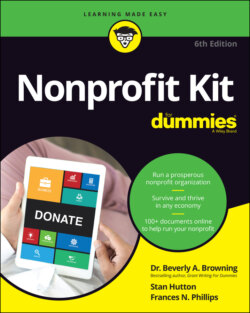Читать книгу Nonprofit Kit For Dummies - Stan Hutton, Beverly A. Browning - Страница 35
Understanding Nonprofit Ownership
ОглавлениеWe (Stan and Frances) once received a telephone call from a man who was shopping for a nonprofit to purchase. “Do you know if there are any nonprofits for sale in New Hampshire?” he asked. Although this question doesn’t come to us often, it illustrates a misconception about the status of nonprofit organizations. No single person or group of people can own a nonprofit organization. You don’t see nonprofit shares traded on stock exchanges, and any “equity” in a nonprofit organization belongs to the organization itself, not to the board of directors or the staff. IRS regulations allow the assets of nonprofits to be sold, but the proceeds of the sale must benefit the organization, not private parties.
If you start a nonprofit and decide at some point that you no longer want to manage it, you have to walk away and leave the running of the organization to someone else. Or, if the time has come to close the doors for good, any assets the organization owns must be distributed to other nonprofits fulfilling a similar mission. You need to follow the laws of the IRS and your state to close the nonprofit organization, including selection of an appropriate and, in some cases, approved nonprofit that will receive the assets.
When nonprofit managers and consultants talk about ownership of a nonprofit organization, they’re using the word metaphorically to make the point that board members, staff, clients, and the community (your stakeholders) all have a stake in the organization’s future success and its ability to provide needed programs.
